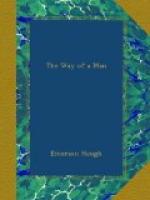“I see there,” I said, and pointed it out to her, “only a Garden, a vast, sweet Garden. And there arises a Tree—–one Tree.”
This was my world. But she, looking out over the Plains, still saw with the eye of yesterday. Upon woman the artificial imprint of heredity is set more deeply than with man. The commands of society are wrought into her soul.
CHAPTER XXX
THEY TWAIN
Even as we were putting together our small belongings for the resumption of our journey, I looked up and saw what I took to be a wolf, stalking along in the grass near the edge of our encampment. I would have shot it, but reflected that I must not waste a shot on wolves. Advancing closer toward it, as something about its motions attracted me, I saw it was a dog. It would not allow me to approach, but as Ellen came it lay down in the grass, and she got close to it.
“It is sick,” she said, “or hurt,” and she tossed it a bone.
“Quick,” I called out to her, “get it! Tame it. It is worth more than riches to us, that dog.”
So she, coaxing it, at last got her hands upon its head, though it would not wag its tail or make any sign of friendship. It was a wolfish mongrel Indian dog. One side of its head was cut or crushed, and it seemed that possibly some squaw had struck it, with intent perhaps to put it into the kettle, but with aim so bad that the victim had escaped.
To savage man, a dog is of nearly as much use as a horse. Now we had a horse and a dog, and food, and weapons, and shelter. It was time we should depart, and we now were well equipped to travel. But whither?
“It seems to me,” said I, “that our safest plan is to keep away from the Platte, where the Indians are more apt to be. If we keep west until we reach the mountains, we certainly will be above Laramie, and then if we follow south along the mountains, we must strike the Platte again, and so find Laramie, if we do not meet any one before that time.” It may be seen how vague was my geography in regard to a region then little known to any.
“My father will have out the whole Army looking for us,” said Ellen Meriwether to me. “We may be found any day.”
But for many a day we were not found. We traveled westward day after day, she upon the horse, I walking with the dog. We had a rude travois, which we forced our horse to draw, and our little belongings we carried in a leathern bag, slung between two lodge poles. The dog we did not yet load, although the rubbed hair on his shoulders showed that he was used to harness.
At times on these high rolling plains we saw the buffalo, and when our dried meat ran low I paused for food, not daring to risk waste of our scanty ammunition at such hard game as antelope. Once I lay at a path near a water hole in the pocket of a half-dried stream, and killed two buffalo cows. Here was abundant work for more than two days, cutting, drying, scraping, feasting. Life began to run keen in our veins, in spite of all. I heard her sing, that day, saw her smile. Now our worldly goods were increasing, so I cut down two lodge poles and made a little travois for the dog. We had hides enough now for a small tent, needing only sufficient poles.




